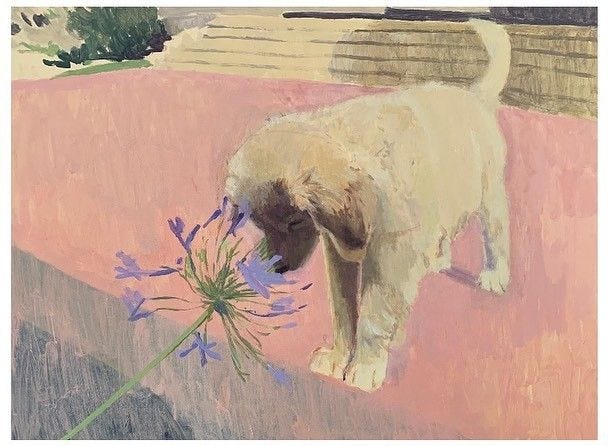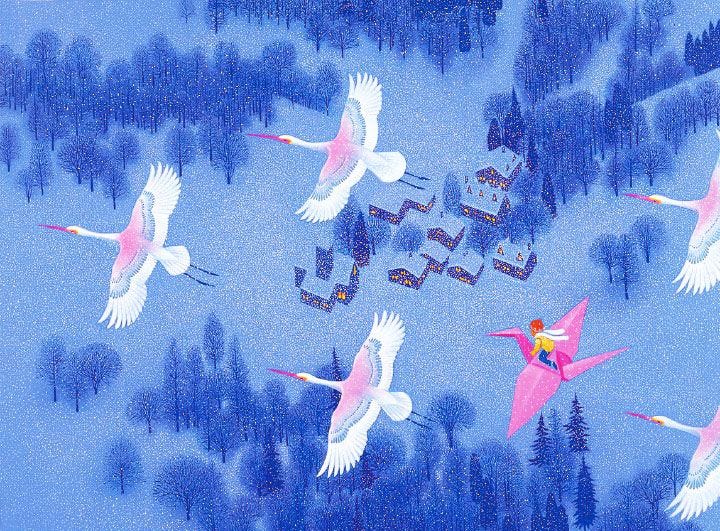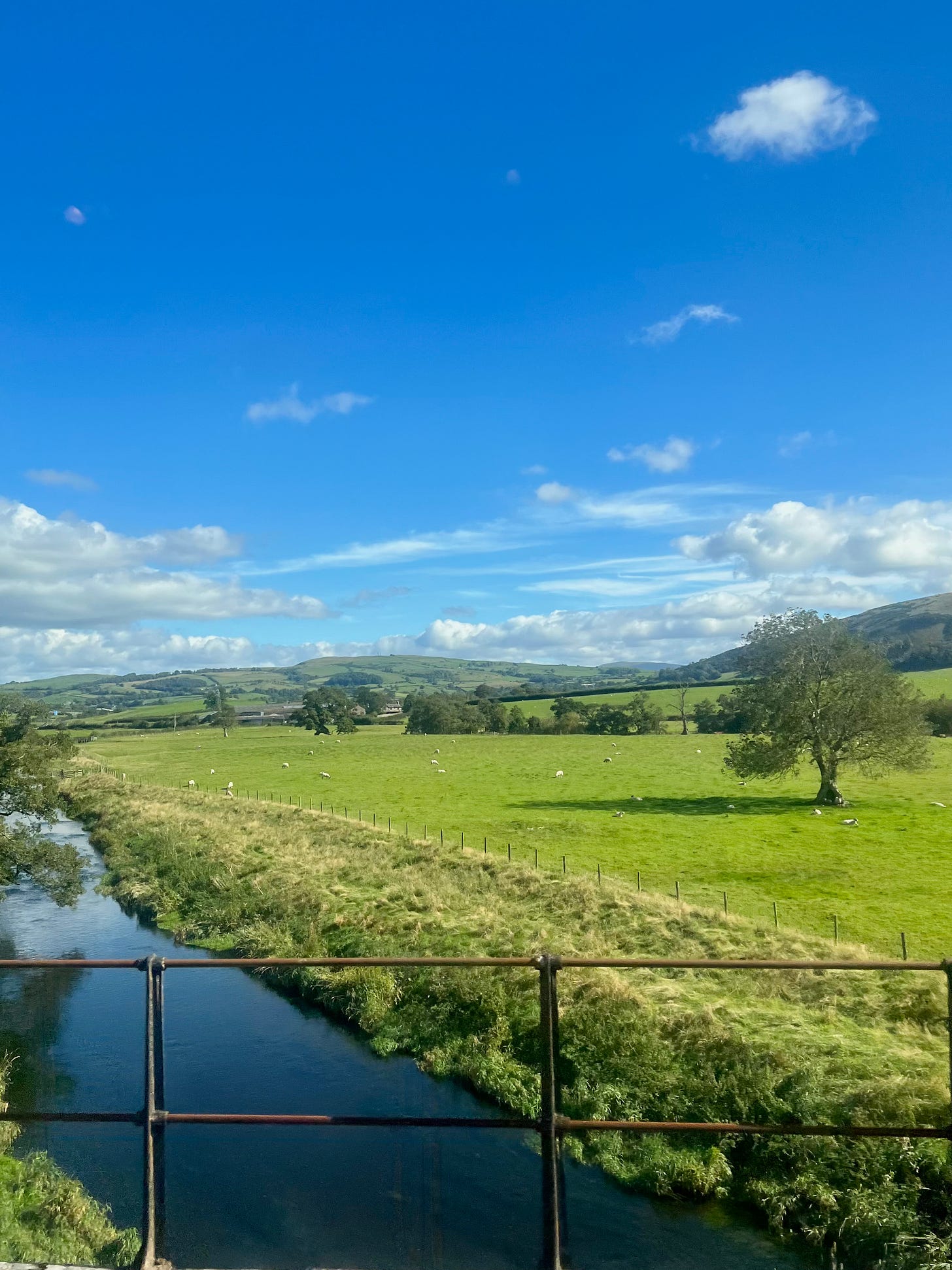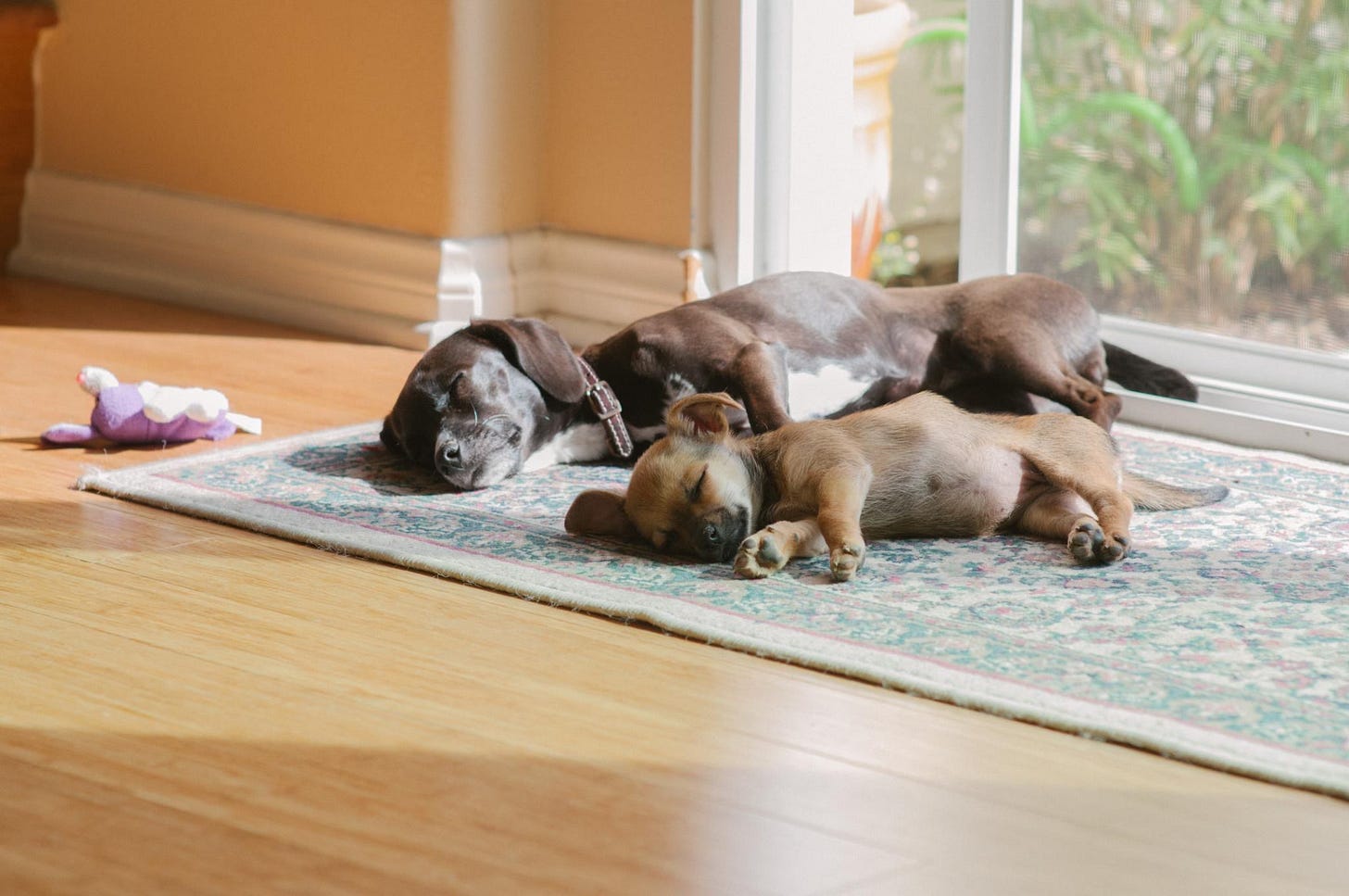The day after I signed with a literary agent for my debut novel, I woke up crying about dogs. Jacob, my boyfriend, asked me what was wrong. “I miss my dogs,” I kept repeating. “I miss my dogs.” I thought, I need to go back to America.
My childhood dogs died a few years ago. The younger one, Lala, was the first to go. Then, years later, Mimi. My first dog, whose soft black ears I used to picture putting in my mouth, imagining they would melt. We adopted her the same week my family moved into our first house in California. When she pissed herself out of excitement, there was nothing for her to stain.
It was strange for me to cry about my dogs. It sounds bad, but their deaths were not as debilitating as I know the deaths of pets can be. I wept both times, was sad for a while. But I moved on. I thought of them in passing moments, always with a twinging feeling but no great devastation. Until, years later, I dreamed of them.
In the dream Lala sat in my arms, shrunken and bone-thin, like a little raw bird. She nosed my hands open so that they held her face. It’s you, I thought. I missed you. Comfortable, or possibly in pain, she burrowed deeper against me. I held her like this, in awe of how she found me, wondering why she took so long. I tried to stay in the dream. I knew that by waking I would leave her, completely alone, with no idea where I went or why I left.
I moved to London from California two summers ago. That makes it sound longer than it is, really it’s only been a year and a half. I am always doing the math in my head, but the numbers I come up with don’t feel like the numbers they are. Mostly I moved to be with Jacob, who is from here. It sounds like a concession when you say you moved to be closer to someone else, but it has been the joy of my life. I love the city, the way my life has filled up to meet it. I don’t want to go back to America, at least not yet. That morning, though, the belief that it was necessary was clear and alarming, like an SOS being signalled into my brain. I need to go back to America, I thought. Leave this place, and my life.
After the image of shrunken-Lala lost its visceral edge and faded to fiction, the way all dreams feel after only a few blinks, I understood that the focus of the message was not America, but instead the two words before it. Go back. Back to the dream, where my dog needed me; or back to 2008, when the first one arrived; or before then, even, back to the two-bed apartment my family lived in before our house, in a small complex crowded with trees, which you could smell in the evening when you were taking out the trash, and most of which eventually got razed down alongside the apartments; back when my sister and I spent afternoons looking after other peoples’ pets, making twenty or so dollars to spend on nothing; back before I could ride a bike; back before the rest of my life happened.
Or maybe it was only back one day. Before my dream. Before I knew how much I missed my dogs, my home. Before I felt sorry for leaving.
It was surprising to feel this. Like I’d run a great distance only to realize, upon looking down, that a thin rope had been hanging around my ankle the whole time. The length of it was so long, and the knot so loose, that it rarely tugged at all, and when it did the feeling was non-urgent, phantom. My parents have never guilted me over my move to London. My dad always called my sister and me his little birds, our destiny to fly away from home. They’re generous people who’ve made it clear that my life is, first and foremost, mine. It’s not a gift every child gets, and I’m grateful.
But I wonder if I’m taking advantage. Beneath the sense of belonging I build in this new city is the fact of our distance, the extraordinary length of the rope. This distance might feel shorter if as an adult I were better at calling, if as a teenager I were more devoted, if as a child I cherished everything so I would no longer feel cheated when they disappeared. But as it stands, I feel the rope. And I know it must exist for everyone, because for everyone there is a fact of having left. Once you leave home, it becomes changed each time you return. Spoons in different drawers. New locks. No dogs.
James Baldwin wrote, “You don't have a home until you leave it and then, when you have left it, you never can go back.” Maybe my guilt, then, isn’t about leaving. Maybe it’s because, like a child who forgot their teddy on the plane, I’ve only realized I’ve left something behind when I can no longer have it again. And it’s not just the house I grew up in, it’s the place of it, the deceptively invisible walls of state and country. As fires first raged through Los Angeles a few days ago, I was asleep. Sometimes on visits back, I overhear people debating with vigor some political news I’ve yet to form an opinion on, or discover a new rule for driving on the freeway. More times than I expect, I see the country, and my relation to it, anew.
During my first year in London, people frequently asked if I missed home. The truth was that I didn’t. I had moments of culture fatigue. I longed for afternoon walks with my best friend, good matcha, my parents’ cooking. But mostly, that year, I cared about one thing only: finishing my novel.
I started writing my novel at the start of 2023, just shy of my twenty-fifth birthday. I moved to London that June. After the dust settled, I threw myself back in. I wrote in the mornings and on commutes and in bed on my Notes app when an idea struck. I also didn’t write, and in those times I was anxious, wrote about not writing, cried. I went to parties and said, without a glimmer of irony or consideration for the person who would be responsible for continuing the conversation, “I feel like I’m in a cage of my own making.” I took a week off work in December and went to the sea to write fifty pages I’d later delete. Around the new year, I finished a viable first draft. I revised many times. I sent it to a trusted friend the day before my twenty-sixth birthday in February. Then I rescinded it before she opened the file and rewrote the entire thing. I sent it to the friend again, and to another, and another. My second summer in London passed. I enjoyed myself, I travelled. Always in my head was the novel, the state of it, what I needed to do to make it better, how long until I heard back from another reader. Finally it was August, the Sunday of the year. I was ready for the most painful part, which was sending it to agents, in the hopes one would bite.
Except it wasn’t painful, not really. At this point I felt a rare sense of calm about the manuscript. Plus, I’ve always loved emailing. (I’m being a bit glib, but I did find real pleasure in crafting letters to agents I’ve long followed and admired, attaching the first ten pages of my manuscript, hitting send. ) The title of my book, in all caps, sat in stacked subject lines down my outbox. It felt so real. It wasn’t painful because, finally, it was out of my control.
I waited. A few agents requested to read the full manuscript. Each time the excitement I felt was violent, obliterating all other feeling so that for a few minutes I felt like a kid having a temper tantrum, except I was happy, but really I was mad at myself for believing I could get what I wanted.
Weeks passed. I thought of nothing else. Jacob and I went to America to visit my parents, and we went camping at the Grand Canyon. I looked at the Grand Canyon, its six million year old rocks, and thought about PDFs. In the tent I refreshed my email over and over, my thumb swiping the dust that gathered on the screen from the tarp so that I could always make out a sliver of my pinched face.
On my last morning in California, I got my first offer of representation. Everything was a whirlwind after that, though I still spent most of my time waiting—waiting for sleep to push through the jet lag, waiting for other agents to get back to me, waiting to get off work to speak to them, waiting for a feeling of certainty to strike, to know what to do next, until I received a letter from an agent who had understood and reflected back the heart of my novel in such a way that I knew she was the right one, and finally since everything began I felt something like triumph.
So I thought the happiness would last longer than the afternoon. But by evening it was gone, I felt nothing. Or it was something that I couldn’t really describe, unfamiliar and therefore nameless.
And then I woke up crying about my dogs. (But, you’ll have understood by now, it wasn’t really about my dogs.)
The grief was large. I wondered if it had always been there, hiding in secret, waiting to be felt as soon as there was nothing else to think about. And then I worried that I only wrote my novel to distract myself from this persistent and petulant low-grade suffering, the fear of time passing, the guilt of leaving, the feeling that there would always be more and more to miss. The clarity of relief I gained from moving forward with my book was like putting on glasses for the first time and seeing all that’s surrounding you, not just the thing you’re looking at.
I had a train to catch that day. It rained, hard, and I sat by the window. I was going to Edinburgh to see a couple of my closest friends from college. We’re spread across the world now, in New York, Paris, and London. It seemed impossible that our lives could change so quickly and move so far apart when we used to spend whole evenings in the same bed.
As the train continued up north, the sky cleared. We passed through the Lake District, vast hills of green flecked with grazing cows and florets of trees. I felt a rush of love for the cows, I felt so lucky to be a window passing through. The feeling resounded through every part of me. I wanted to do something with it, but I knew that whatever I did would not be enough. I texted my parents that I loved them. And then I looked at cows until they disappeared.
The train pulled into the station. My friends weren’t due to arrive for hours. It was a brilliant day in Edinburgh, all the city’s stones gleaming with the memory of rain. I wondered what I had now that I would eventually lose. What I would wake up crying about five years later, if it would still be my dogs.
I have to remind myself that my childhood dogs don’t belong purely to my childhood. They accompanied me long into adulthood, Mimi into my mid-twenties. But even though I have many recent memories with them, I still find myself reaching for the old ones. The time I sang “My Heart Will Go On” by Celine Dion to Mimi in our empty living room, brand new for the both of us, marveling at the fact that I could love something so much. The moment Lala barked for the first time when my family were playing a board game, how we all jumped up with delight, leaving the game unfinished. My grandparents moving in with us, learning the names of our animals.
My family and I haven’t played a board game in a while. It’s not that we don’t spend time together anymore, it’s simply that the board games we own, which were designed for children, would no longer be fun.
And I miss the fun we had. Before I knew how much a person can age. The idea that I would one day live in a different house, let alone a different country, as far-fetched as a dream. All you had to do was blink—and look, it wasn’t real.
“I know I’ll miss writing this book once it’s finally done.”
I wrote this in my journal last July. The novel’s not done yet (I’ve just sent off my second full revision), but I know it to be true. Not only because writing this book gives me a specific pleasure unique to the book’s specific characters and challenges, but also because writing this book feels, for now, like the small purpose of my life. Without a thing to look at directly, I seem to turn to familiar fears. I get possessive about the past.
My parents’ house is emptier each year each time I go back. This time, I think about everything they cared for. My grandparents, who lived with us until they were ready to go. The dogs they got because my sister and I begged. My cat, Luna, a surprise gift in my senior year, one last childhood wish they could grant before I left for college. Luna’s still there, she’s as spoiled as she deserves.
If I could go back, would I? Back where? It was not always happy, and often I was scared. I wanted many things that felt impossible and foolish to even think about. But I blink, now, and I have them, or a version of them that feels enough, at least in flashes, like cows in your window after the rain.
If I went back to that brief time when both my dogs were puppies, my parents’ house the only home I knew, could I be an honest visitor? Could I see it for what it was, just another time in my life, not what I romanticize it as? One day wouldn’t be enough, I’d feel robbed. But two days, I know, would be too much. I would get irritated by something somebody did, I would neglect to walk the dogs.
Better to be on the other side, I think. To read my old journal, all its questions, and know at least some of the answers. So many pages spent wondering about the future, a book, a couple bad dreams. So many pages still. Here is the one I am writing. Here is the life I have. I’ll miss this part when it’s over.
What I’m reading: I just finished Giovanni’s Room by James Baldwin (where the quote I cite in this piece comes from). It was stunning, I felt it passed in one long, tightly held breath, it broke my heart over and over again. One of my new favorite books.
I also recently finished Kitchen by Banana Yoshimoto, which is a beautiful meditation on loneliness and love and the daily task of being alive. Now I’m reading something completely different: All That Glitters by Orlando Whitfield, a memoir about the author’s friendship with the infamous art fraudster Inigo Philbrick.
What I’m listening to: One of my favorite musical micro-genres is songs about getting everything you want.
Maybe it’s obvious from this post, but I’ve been thinking about what it means to get what you want, or close to it—how it feels versus how it seems, if the want then changes into something bigger, whether the achieving is less important than the wanting, how dreams can turn from serious to childish in a flash. Time and time again, in moments of pause and clarity in my life, I turn to “Slack Jaw” by Sylvan Esso for its beautifully simple opener—“I got all the parts I wished for / I have everything I need”—which is followed immediately by the more melancholy admission: “Sometimes I’m above water / but mostly I’m at sea.”
Then, recently, this Suki Waterhouse song came on my shuffle. I love it for the heady and crashing chorus opener: “All of my dreams came true.” I adore that sentence, which carries all the opiate bliss of a fairy tale, for how rarely it can be said and how readily, almost flippantly, Waterhouse sings it. And then the next line, which reminds me so much of “Slack Jaw”: “The bigger the ocean, the deeper the blue.”
That’s all for today’s hour. Let me know if you have any thoughts or feelings in response to my thoughts and feelings, it’s my favorite. Or if you have any song recommendations in the “All of my dreams came true” micro-genre, otherwise I will be doing what I do best, which is ruining my favorite songs by listening to them far too much.
<3













"there would always be more and more to miss" ❤️🩹 The kind of writing I live for—no taking sides between happiness and sadness, no grand revelations of outcomes. Just portraying life as it is, with all its complex movements, where endings are continuations. Thank you.
soooo beautifully written!!! i can’t believe the way you’re able to put things into words!!! ITS SO BEAUTIFUL :”) so grateful to read your words!!!